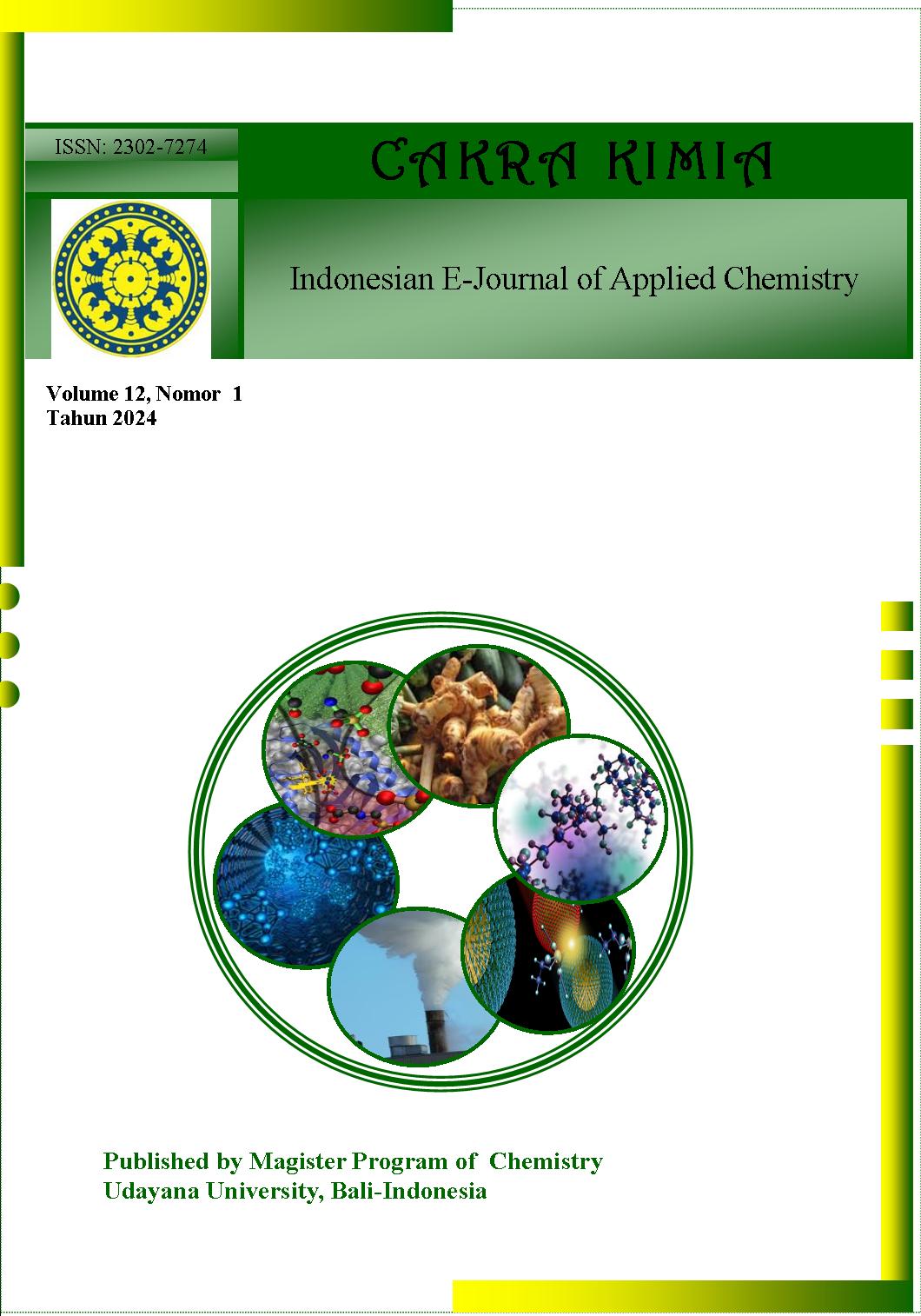ANALISIS SUN PROTECTION FACTOR (SPF) PADA KRIM TABIR SURYA ESTRAK BUAH LEMPENI (ARDISIA ELLIPTICA THUNB.) DENGAN SPEKTROFOTOMETER
Abstract
ABSTRAK : Tabir surya dapat melindungi kulit dari sinar ultraviolet dengan cara menghambat penetrsai sinar. Krim tabir surya berfungsi untuk menyerap, menghamburkan, memantulkan sinar ultraviolet sehingga dapat dimanfaatkan untuk melindungi struktur dan fungsi kulit dari keruskan yang disebabkan oleh paparan sinar ultraviolet, terutama perlindungan dari sinar UV B. Buah lempeni memiliki senyawa asam ?-amyrin, isorhamnetin, syringic dan quercetin. Quercetin merupakan senyawa yang berperan di dalam aktivitas antioksidan. Metode analisis SPF yang digunakan adalah spektrofotometri pada panjang gelombang 290-320 nm, analisis spektrum dan senyawa aktif menggunakan spektrofotometer UV-Vis sedangkan uji organoleptik menggunakan panelis 15 orang. Hasil penelitian menunjukkan bahwa nilai SPF berbeda nyata (p<0,05). Hasil yang diperoleh yaitu formulasi krim kode P4 memiliki nilai tertinggi dengan konsentrasi ekstrak 0,1% memiliki nilai SPF tertinggi 46,33±0,024 dibandingan dengan nilai kontrol 7,28±0,029 memberikan perlindungan terhadap sinar UV. Hasil scanning menunjukkan bahwa perlakuan pemberian ekstrak mengandung senyawa aktif yang lebih kompleks dibandingkan dengan kontrol. Hasil uji organoleptik menunjukkan persentase suka lebih besar dibandingkan tidak suka pada semua atribut pengamatan. Hasil analisis senyawa aktif pada perlakuan P4 menunjukkan kadar tertinggi yaitu total tanin (415,84±0,26 mg TAE/100 g), kadar fenol (271,20±2,10 mg GAE/100 g) dan kapasitas antioksidan (57,09±0,06 mg GAEAC/100 g). Penambahan ekstrak buah lempeni bermanfaat menambah nilai SPF pada krim tabir surya.
ABSTRACT : Sunscreen can inhibit the penetration of ultraviolet rays into the skin. Sunscreen cream preparations can absorb, scatter or reflect UV rays so they can be used to protect the structure and function of the skin from damage due to exposure to UV rays, especially protection from UV B rays. Lempeni fruit contains the compounds syringic acid, isorhamnetin, ?-amyrin and quercetin. Quercetin is one of the active compounds reported to be responsible for antioxidant activity. The SPF analysis method used is spectrophotometry at a wavelength of 290-320 nm, spectrum and active compound analysis using a UV-Vis spectrophotometer while the organoleptic test uses 15 panelists. The results showed that the SPF values ??were significantly different (p<0,05). The results obtained were that the cream formulation code P4 had the highest value with an extract concentration of 0,1% and had the highest SPF value of 46,33±0,024 compared to the control value of 7,28±0,029 providing protection against UV rays. The scanning results showed that the extract treatment contained more complex active compounds compared to the control. The organoleptic test results show that the percentage of likes is greater than dislikes for all observation attributes. The results of the analysis of active compounds in the P4 treatment showed the highest levels, namely total tannin (415,84± 0,26 mg TAE/100 g), phenol content (271,20±2,10 mg GAE/100 g) and antioxidant capacity (57,09±0,06 mg GAEAC/100 g). The addition of lempeni fruit extract is useful in increasing the SPF value of sunscreen cream.
Downloads
References
[2] Hamzah N., Isriany I., Andi D.A.S. Pengaruh Emulgator terhadap Aktivitas Antioksidan Krim Ekstrak Etanol Kelopak Bunga Rosella (Hibiscus sabdariffa Linn)”, Jurnal Kesehatan. 2014. 7 (2).
[3] Alkhali M., And Bandy B. Mechanism of flavonoid protection against myocardial ischemia S. 2019.
[4] Pratama W.A., dan Zulkarnain A.K., Uji Spf In Vitro dan Sifat Fisik Beberapa Produk Tabir Surya yang Beredar di Pasaran. Majalah Farmaseutik. 2015, 11 (1).
[5] Alakh N.S., Jha S.B., and Dubey S.D. Formulation and Evaluation of Curcuminoid Based Herbal Face Cream. Indo-Global Journal of Pharmaceutical Sciences. 2011, 1 (77-84).
[6] Mansur J.S., Breeder M.N., and Azulay R.D. Determinacao do fator de protecao solar por espectrofotometria, An. Bras. Dermatol. 1986, 61 (121-24).
[7] Huang G.J., Chiu C.S., Wu C.H., Huang S.S., Hou W.C., Amagaya S., Sheu M.J., Liao J.C., and Lin Y.H. Redox status of Bowman–Birk inhibitor from soybean influence its in vitro antioxidant activities, Bot Stud. 2010, 51 (431- 437)
[8] Suhardi. Analisis senyawa polifenol produk buah-buahan dan sayuran vol 3. Lab. Kimia-Biokimia Pengolahan Fak. Teknologi Pertanian. Univ Gadjah Mada.Yogyakart. 1997.
[9] Chium C.S., Deng J.S., Chang H.Y., Chen Y.C., Lee M.M., Hou W.C., Lee C.Y., Huang S.S., and Huang G.J. Antioxidant and Anti‑ Inflammatory Properties of Taiwanese Yam (Dioscorea japonican Thunb. var. Pseudojaponica (Hayata) Yamam and Its Reference Compounds. Food Chem. 2013, 14 (1087-1096).
[10] Damogalad V., Edy H.J., dan Supriati H.S. Formulasi krim tabir surya ekstrak kulit nanas (Ananas comosus L. Merr) dan uji in vitro nilai sun protecting factor (SPF). Pharmacon, J. Ilmiah Farmasi UNSRAT. 2013, 2 (12-16).
[11] Susanti M., Dachriyanus. dan Doni P. P. Aktivitas Perlindungan Sinar UV Kulit Buah Garcinia mangostana Linn Secara In Vitro, Pharmacon, 13(2), 61-64.
[12] Cushine T.P.T., and Lamb A.J. Antimicrobial activity of flavonoids, Int. J. Antimicrobial Agents. 2005, 26 (5), 343- 356.
[13] Jurmilam J., Amol S.G., and Priscilla D. Anti-inflammatory, antioxidant and anticancer activity of quercetin and its analogues. Int J Res Pharm Biomed Sci. 2011, 2 (1756–1766).
[14] Hagerman A.E., Riedl K.M., Jones G.A., Sovik K.N., Ritchard N.T., Hartzfeld P.W., and Riechel T.L. High molecular weight plant polyphenolics (tannins) as biological antioxidants. J Agr Food Chem. 1998, 46 (5), 1887-1892.



 Petunjuk Penulisan
Petunjuk Penulisan
